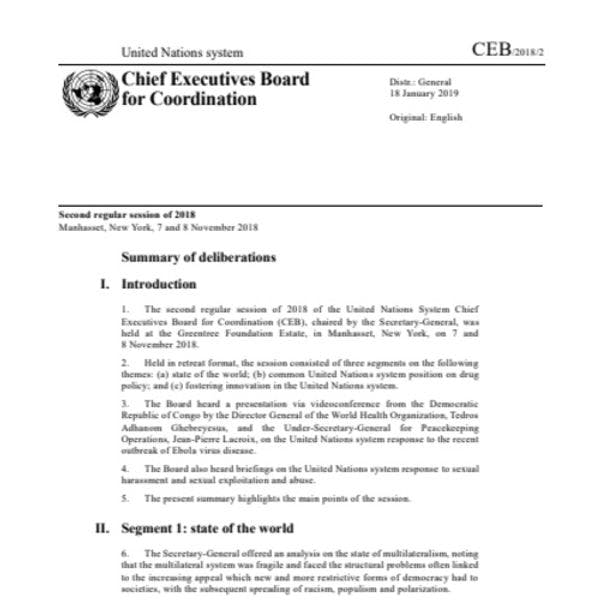UN system common position on international drug control policy through effective inter-agency collaboration
The UN system common position on international drug control policy through effective inter-agency cooperation (often colloquially referred to as 'UN common position on drug policy' or 'UN common position on drugs') is available in Annex I of the document below.
In 2009, the international community agreed on a global strategy for addressing the world drug problem. With the adoption of the Political Declaration and Plan of Action on International Cooperation towards an Integrated and Balanced Strategy to Counter the World Drug Problem, Governments established 2019 as the target year for States to eliminate or reduce significantly and measurably the illicit cultivation, production, trafficking and use of drugs, as well as the diversion of precursors, and money-laundering. In 2016, the General Assembly held a special session on the world drug problem to review progress made in the implementation of the Political Declaration and Plan of Action and adopted resolution S-30/1, entitled “Our joint commitment to effectively addressing and countering the world drug problem”.
The Commission on Narcotic Drugs, a functional commission of the Economic and Social Council mandated to monitor the world drug situation, develop strategies on international drug control and recommend measures to address the world drug problem, will convene a two-day ministerial segment at its sixty-second session in March 2019 in Vienna to take stock of the implementation of drug control-related commitments.
To ensure a common United Nations system position on the matter at the ministerial segment of the Commission on Narcotic Drugs, CEB held deliberations on drug policy, informed by the contents of a discussion paper prepared under the auspices of the High-level Committee on Programmes through a consultative process coordinated by the United Nations Office on Drugs and Crime (UNODC). The paper contained an overview of the world drug problem and an analysis of key issues emanating from the international policy discourse, as well as ideas and measures to assist CEB in articulating a common United Nations position, with a view to enhancing system-wide coordination and coherence in the lead-up to the 2019 ministerial segment.
The common position includes strong support for policies that put health, human rights and evidence at the centre, and calls for a review of laws, policies and practices that threaten the health and human rights of people. The position promotes harm reduction interventions and the decriminalisation of people who use drugs.
